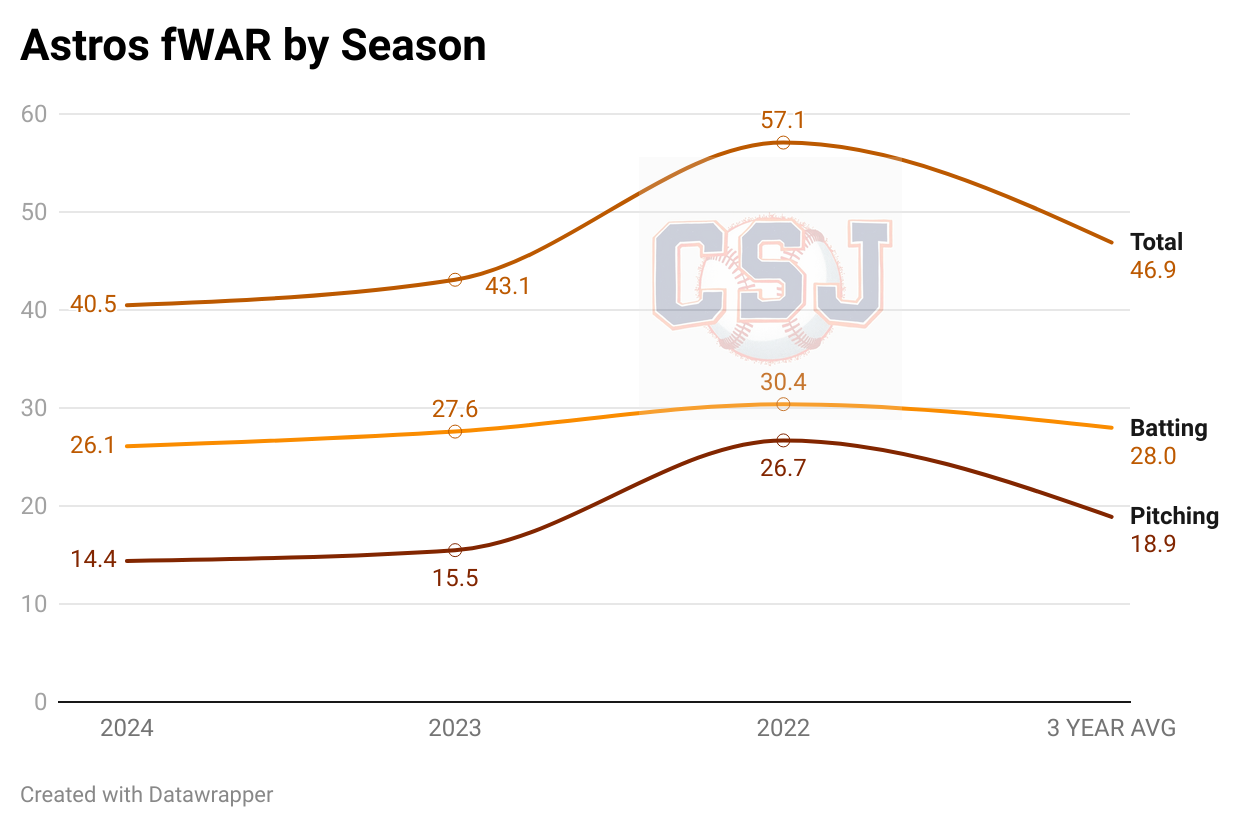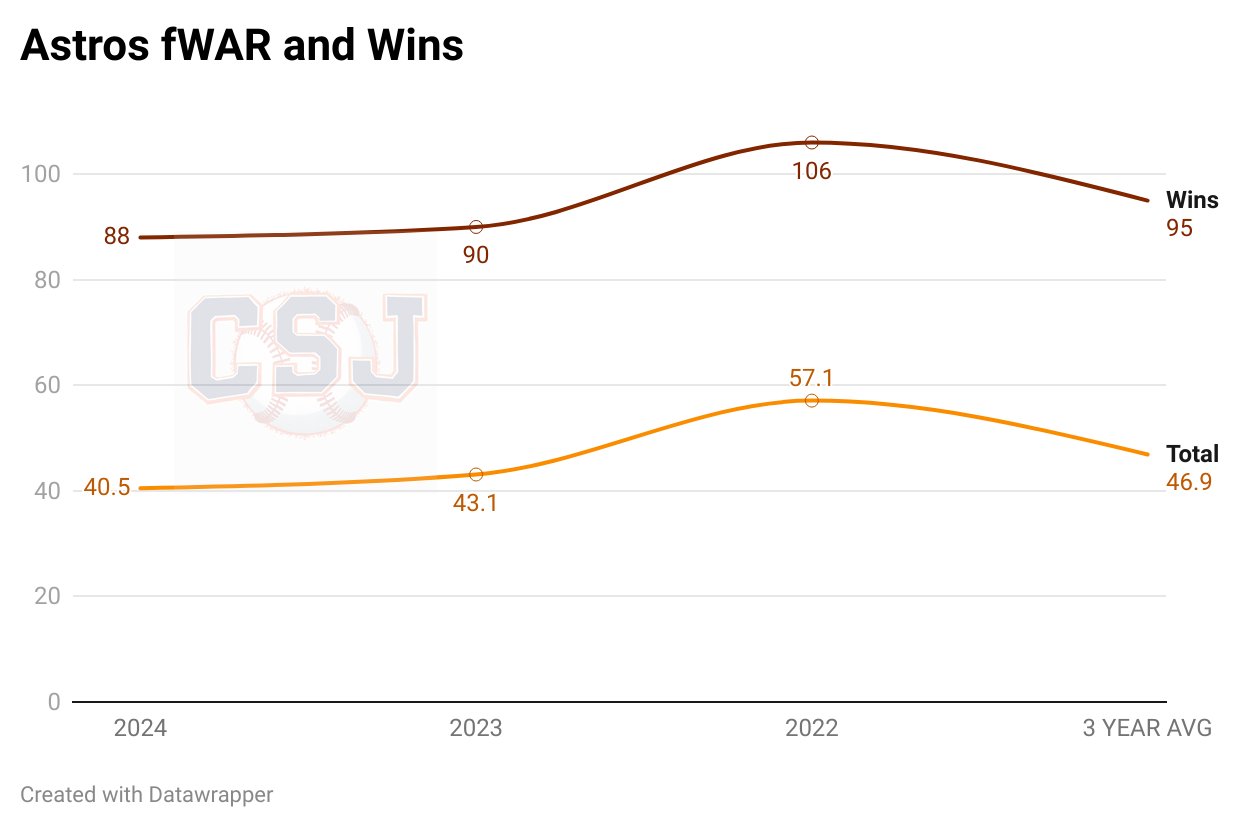A Truce in the War on WAR
I wasn't wrong, but I wasn't right, either
For someone who doesn’t find a ton of value in the fWAR stat as it’s commonly used, I’ve been writing and thinking about it a lot lately.
From evaluating what the potential loss of Alex Bregman means in terms of wins to assigning win shares, I’ve tried to be open-minded and make use of the stat I have rarely used or written about.
Part of my mission here is to dispel myths and narratives that are widely believed, but not true.
As part of that, I try to admit when I’m wrong, or if I try to dispel a “myth” and it turns out to be true or partially true, I will share that, too.
Perhaps I was wrong about fWAR.
It still doesn’t make a lot of sense to me to name something “Wins Above Replacement” when it means no such thing as I’ve already pointed out, but it turns out you may be able to tell something from a team’s total fWAR.
Something pretty important like the higher fWAR, the more wins, which I know isn’t rocket science.
The years are in reverse order, but you can see that 2022 was the peak of recent seasons for the Astros in terms of total fWAR, they slid massively in 2023 (-24.5%) and further in 2024 (-6% from 2023 and -29%.1% from 2022).
Below is the fWAR and number of wins and the lines look gloriously correlated, almost like you could overlay the two and there would be one line. Almost.
Up goes team fWAR, up goes wins.
Down goes team fWAR, down goes wins.
This was a learning lesson for me and in retrospect, it makes sense, given the various components of fWAR.
I got distracted by the name, which blinded me to how useful the stat can be if considered differently.
Here’s a couple of interesting things about the fWAR the research has shown me:
fWAR is like Bitcoin. There’s only so much of it. The MLB totals were 999.9, 1000.0 and 999.7 over the last three years, respectively.
I’m not sure if the 1,000 (or close to it) total is intentional or just happenstance, but the finite amount makes sense. If the Astros are bashing the Dodgers and adding to their fWAR total, the Dodgers are losing fWAR at the same time. It’s a zero-sum game.
Secondly, the average fWAR per win has been 0.41 in all three seasons (2022-2024) across MLB, which makes perfect sense given the limited amount of fWAR and wins and losses throughout a season.
Conclusion: Dubious Name, Useful Stat
While I’m still dubious of using fWAR as the be-all and end-all for individual players, and it certainly doesn’t represent an actual “win above replacement”, team fWAR can be a useful tool to predict playoff contenders, outliers, or sleeper teams, for example.
An example: At the end of last May the Astros were 25-33 with a 3.2 fWAR, an average of 0.13 fWAR per win, 72% below their three-year average of 0.46 fWAR per win.
In an average year, we’d expect the Astros to be around 11.5 fWAR after 58 games or even 10.3 at the league average of .41 fWAR per win.
Only one team (you guessed it, the 2024 White Sox) had less fWAR per win in the last three seasons.
Thought about in another way, that’s 1 of 90 teams or 1.1%.
At the time, Fangraphs assigned the Astros a 36.3% chance of making the playoffs, but using this information, I would guess it was much higher.
The Astros were accumulating fWAR like one of the worst teams in the last three years, which they certainly weren’t and their suck wasn’t sustainable for a full season.
Simply put, a team with Tucker (injured shortly thereafter), Alvarez, Bregman and Altuve, along with Framber, Brown, Hader, etc is objectively not one of the worst teams in ANY season.
Sure enough, by the end of the season the Astros total fWAR was 10th in the league and their fWAR per win was 11th, as they accumulated 0.62 fWAR per win over the next 103 games.
They never fully recovered from that horrible start, but in the end, were much closer to what they have been in recent seasons as their 63-40 finish showed.
To be clear, I only looked at three years, so there’s more work to be done.
Some may think I’m unhappy about finding out I was “wrong”, but nothing could be further from the truth.
I now see fWAR as another tool I can use moving forward to better analyze players and teams.
Thanks for reading!




